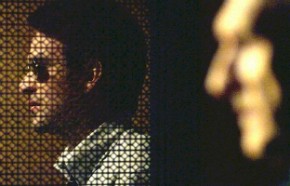Blind vigilante

Religion is rarely featured in stories about superheroes. Clark Kent’s parents, for example, were Methodists. This was his Jewish creators’ way of communicating that Superman was a trustworthy middle American. More typically superheroes have no religion; they are quasi-religious saviors. This makes the hero of the new Netflix series Daredevil unusual.
Like House of Cards and Orange Is the New Black, Daredevil (one of four planned Marvel superhero series) establishes Netflix as a major entertainment production company. Lawyer Matt Murdock is also superhero Daredevil (played by Charlie Cox). Daredevil may actually believe in a God bigger than himself. He most certainly believes in the church. Early in the 13-episode series Daredevil is in a confessional booth seeking penance not for what he’s done, but for what he’s about to do. Before the priest can call after him, “It doesn’t work that way,” he’s off, a blind vigilante with heightened senses battling for justice.
Read our latest issue or browse back issues.
In the series, we learn that Daredevil lost his sight in a childhood accident. But his other senses are intensified. He can hear conversations blocks away, can sense in a person’s heartbeat whether he’s lying, and can leap across buildings and defeat legions of bad guys with all varieties of martial arts. He laments his loss of sight—“There’s not a day where I don’t wish I could see the blue sky”—but his powers serve him well. When the villain’s money man tries to hire Murdock’s law firm, his partner Foggy Nelson (Elden Henson) wants to take the money despite the client’s shady reputation. “You wouldn’t care if you could see the zeroes on this check,” Nelson says. “Maybe you would if you couldn’t,” Murdock replies.
Daredevil’s producers are proud of the fact that their superhero lives close to the ground and spends a lot of the show being stitched up and stumbling around. As one producer pointed out, there’s no figure flying through the sky here, no magic hammer (a surprising shot at fellow Marvel character Thor). But there is a lot of heroin pulsing through New York, international gangsters buying off cops, journalists, and judges—and there’s Daredevil, who can “see” it all.
As a show Daredevil’s not bad, and occasionally it’s really good. Its characters are likable and believable; even villain Wilson Fisk (Vincent D’Onofrio) has texture. Fisk kills his father to stop him from beating his mother. And he truly believes he can “save” the Hell’s Kitchen neighborhood in New York City by redeveloping it. But the plots in Daredevil are tangled and often distract from the good versus evil morality play.
The show uses Catholicism to strengthen the picture of Daredevil as an ordinary guy. At one point Father Lantom (Peter McRobbie) asks Daredevil how he’s holding up. “Like a good Catholic boy,” he says. “That bad, eh?” Father cracks. Claire Temple (Rosario Dawson), his nurse and collaborator, marvels at the amount of punishment Daredevil can take without complaint. “That’s the Catholicism,” he smirks. Claire’s only memory from Sunday school is that the martyrs, saints, and saviors “all end up bloody and alone.” And there’s running conversation with Father Lantom about the origin and nature of the devil.
The exploration of the problem of evil, common to all superhero stories, has an especially dark tone here. In one episode villain Fisk smashes a gangster’s head off with a car door. Crime boss Madame Gao (Wai Ching Ho) blinds her heroin-making slaves so they’ll work the assembly line without trying to escape. And the hero himself engages in an unexpected level of violence. Unlike Christopher Nolan’s Batman films, which flirt with this theme of vigilante-for-good, Daredevil is serious. He doesn’t just punch; he throws villains off roofs. During one interrogation Claire suggests that he cut into the villain’s nerve in the orbital bone above his eye with a knife. He does.
Perhaps because of this level of violence, the show features an ongoing religious conversation about the nature of evil. Father Lantom opines that God creates the devil to frighten us all to “tread the way of the righteous.” This dodgy theology aside, the priest argues convincingly for the existence of the devil. He tells of a good and holy man in Rwanda who was hacked to bits by his neighbors. “The devil walks among us,” he concludes.
Daredevil responds, “What if we could stop him from hurting anybody else?” In his first act as Daredevil, he sees a father abusing his daughter. Daredevil beats the father senseless and sends him to the hospital to “eat through a straw.” His law partner Foggy wonders aloud, “Maybe you just want an excuse to hit people, you can’t stop yourself.” “I don’t want to stop,” Daredevil says. Meanwhile, he keeps going back to Father Lantom for spiritual comfort because he needs it: he’s going to defend his city even if he has to destroy himself to do it.
Yes, the collateral damage is high. Friends and neighbors fall to the bad guys before Daredevil can protect them. But in the end he wins. This is, after all, a superhero franchise, not an antihero one.





